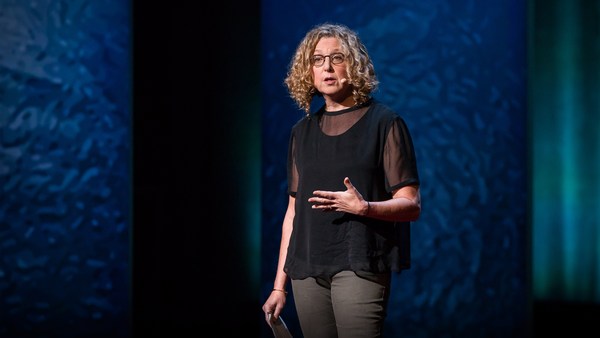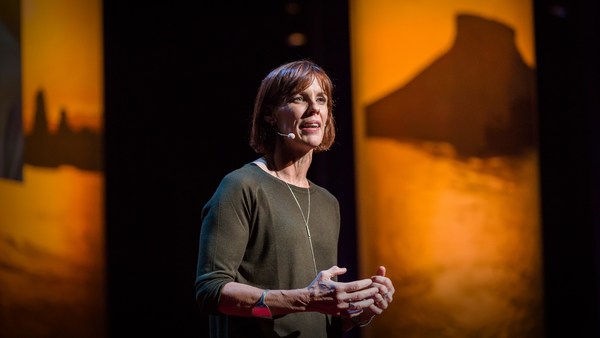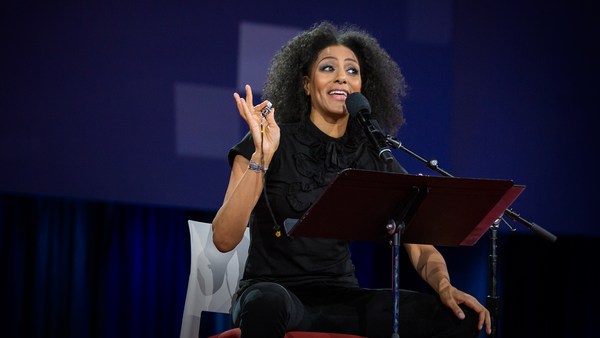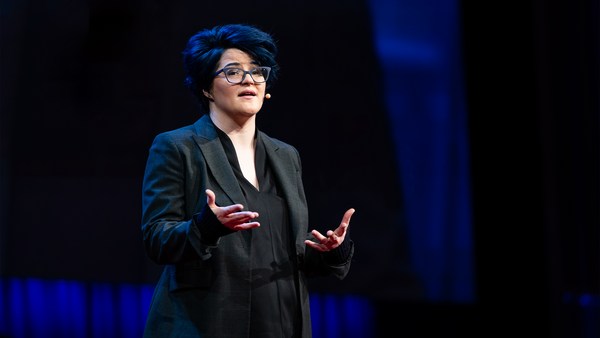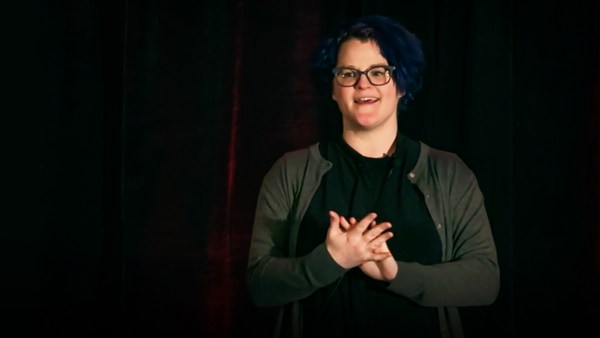I remember my aunt brushing my hair when I was a child. I felt this tingling in my stomach, this swelling in my belly. All her attention on me, just me. My beautiful Aunt Bea, stroking my hair with a fine-bristled brush. Do you have a memory like that that you can feel in your body right now?
Before language, we're all sensation. As children, that's how we learn to differentiate ourselves in the world -- through touch. Everything goes in the mouth, the hands, on the skin. Sensation -- it is the way that we first experience love. It's the basis of human connection. We want our children to grow up to have healthy intimate relationships. So as parents, one of the things that we do is we teach our children about sex. We have books to help us, we have sex ed at school for the basics. There's porn to fill in the gaps -- and it will fill in the gaps.
(Laughter)
We teach our children "the talk" about biology and mechanics, about pregnancy and safe sex, and that's what our kids grow up thinking that sex is pretty much all about. But we can do better than that. We can teach our sons and daughters about pleasure and desire, about consent and boundaries, about what it feels like to be present in their body and to know when they're not. And we do that in the ways that we model touch, play, make eye contact -- all the ways that we engage their senses. We can teach our children not just about sex, but about sensuality.
This is the kind of talk that I needed as a girl. I was extremely sensitive, but by the time I was an adolescent, I had numbed out. The shame of boys mocking my changing body and then girls exiling me for, ironically, my interest in boys, it was so much. I didn't have any language for what I was experiencing; I didn't know it was going to pass. So I did the best thing I could at the time and I checked out. And you can't isolate just the difficult feelings, so I lost access to the joy, the pleasure, the play, and I spent decades like that, with this his low-grade depression, thinking that this is what it meant to be a grown-up.
For the past year, I've been interviewing men and women about their relationship to sex and I've heard my story again and again. Girls who were told they were too sensitive, too much. Boys who were taught to man up -- "don't be so emotional." I learned I was not alone in checking out. It was my daughter who reminded me of how much I used to feel. We were at the beach. It was this rare day. I turned off my cell phone, put in the calendar, "Day at the beach with the girls." I laid our towels down just out of reach of the surf and fell asleep. And when I woke up, I saw my daughter drizzling sand on her arm like this, and I could feel that light tickle of sand on her skin and I remembered my aunt brushing my hair. So I curled up next to her and I drizzled sand on her other arm and then her legs. And then I said, "Hey, you want me to bury you?" And her eyes got really big and she was like, "Yeah!" So we dug a hole and I covered her in sand and shells and drew this little mermaid tail. And then I took her home and lathered her up in the shower and massaged her scalp and I dried her off in a towel. And I thought, "Ah. How many times had I done that -- bathed her and dried her off -- but had I ever stopped and paid attention to the sensations that I was creating for her?" I'd been treating her like she was on some assembly line of children needing to be fed and put to bed. And I realized that when I dry my daughter off in a towel tenderly the way a lover would, I'm teaching her to expect that kind of touch. I'm teaching her in that moment about intimacy. About how to love her body and respect her body. I realized there are parts of the talk that can't be conveyed in words.
In her book, "Girls and Sex," writer Peggy Orenstein finds that young women are focusing on their partner's pleasure, not their own. This is something I'm going to talk about with my girls when they're older, but for now, I look for ways to help them identify what gives them pleasure and to practice articulating that. "Rub my back," my daughter says when I tuck her in. And I say, "OK, how do you want me to rub your back?" "I don't know," she says. So I pause, waiting for her directions. Finally she says, "OK, up and to the right, like you're tickling me." I run my fingertips up her spine. "What else?" I ask. "Over to the left, a little harder now."
We need to teach our children how to articulate their sensations so they're familiar with them. I look for ways to play games with my girls at home to do this. I scratch my fingernails on my daughter's arm and say, "Give me one word to describe this." "Violent," she says. I embrace her, hold her tight. "Protected," she tells me. I find opportunities to tell them how I'm feeling, what I'm experiencing, so we have common language. Like right now, this tingling in my scalp down my spine means I'm nervous and I'm excited.
You are likely experiencing sensations in response to me. The language I'm using, the ideas I'm sharing. And our tendency is to judge these reactions and sort them into a hierarchy: better or worse, and then seek or avoid them. And that's because we live in this binary culture and we're taught from a very young age to sort the world into good and bad. "Did you like that book?" "Did you have a good day?" How about, "What did you notice about that story?" "Tell me a moment about your day. What did you learn?" Let's teach our children to stay open and curious about their experiences, like a traveler in a foreign land. And that way they can stay with sensation without checking out -- even the heightened and challenging ones -- the way I did, the way so many of us have.
This sense education, this is education I want for my daughters. Sense education is what I needed as girl. It's what I hope for all of our children. This awareness of sensation, it's where we began as children. It's what we can learn from our children and it's what we can in turn remind our children as they come of age.
Thank you.
(Applause)
